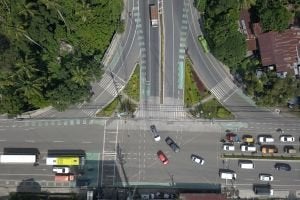Overview
Systemic strategic and policy changes implemented by the World Bank to improve road safety ⌵
Road safety is a key deliverable for roads and urban mobility projects by the World Bank, as now reflected in the Environmental and Social Framework (via road safety in ESS4).
GRSF has been a key advocate, influencer, trainer, and technical assistance provider in road safety for World Bank projects. Until 2019, these roles were largely ad hoc, based on available resources and the level of commitment of clients and World Bank project staff. This collaboration has moved the World Bank’s approach to road safety to a new paradigm: a more deeply systematic, consistent and better-informed paradigm. This was achieved through the delivery of key knowledge products, stronger policy, effective training, and collaborative work with many teams:
Good Practice Note: Environment & Social Framework for Investment Operations Road Safety ⌵︎
With the development of innovative pioneering knowledge products, the Road Safety Team is improving the Bank’s internal processes by supporting operational teams with vital contributions: The Good Practice Note (GPN) on Road Safety provides guidance to World Bank staff on how to support the Borrowers’ efforts to improve road safety on World Bank supported projects to meet the requirements of the respective World Bank Environmental and Social Standard – ESS4.
The GPN articulates a holistic systematic approach to road safety, embodying in the ‘Safe System’ approach with practical directions. It delivers practical steps towards the innovative approach broadly derived from Vision Zero that sets a long-term vision for road systems to be free of deaths and debilitating injuries.
The Road Safety Screening and Appraisal Tool ⌵︎
The World Bank has developed the Road Safety Screening and Appraisal Tool (RSSAT) for ex-ante assessment of road engineering and design and economic analysis applicable for all road infrastructure projects in the World Bank pipeline.
During FY20, the use of RSSAT during project preparation informed design decisions that will yield to a reduction between 25%-50% of road traffic fatalities in World Bank projects compared to the original interventions planned without the use of RSSAT. This innovative tool provides opportunity for identifying optimal scope of road infrastructure interventions needed to save lives through World Bank financed transport projects. During the pilot phase in FY20, RSSAT was implemented in a set of 22 road segments selected from 6 projects. Overall, the six projects involved a total World Bank financing of 1.6 billion USD which have now been screened through the RSSAT.
After successful trials in 2019-2020, use of the RSSAT is now required for all World Bank transport projects, and it is also recommended to be used for other operations that can have road safety impacts, such as urban and agriculture projects. The RSSAT produces a metric called Project Safety Impact, which is the ratio of road traffic fatalities with project to without project. It also assigns a road safety risk level for the existing situation as well as the project scenario based on number of fatalities, and finally it presents the monetized road safety costs/benefits over the analysis period of the project.
GRSF-WORLD BANK CROSS-SUPPORT IN FY20 ⌵

The Key Impact
-

+50 World Bank projects
supported by GRSF in 8 regions, 30 countries (FY20) -

25%-50% reduction
of road traffic fatalities in World Bank projects compared to the original interventions planned without the use of RSSAT -

RSSAT usage
is now required for all World Bank transport projects -

Winning project
of the 2020 Prince Michael Awards
Learn more about this project
GRSF 2020 Annual Report











